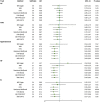Causal relationship between tea intake and cardiovascular diseases: A Mendelian randomization study
- PMID: 36225867
- PMCID: PMC9548982
- DOI: 10.3389/fnut.2022.938201
Causal relationship between tea intake and cardiovascular diseases: A Mendelian randomization study
Abstract
Background: Although studies suggest that tea consumption is associated with a reduced risk of cardiovascular disease (CVD). There is no unified conclusion about the potential relationship between tea drinking and CVD. We used a two-sample Mendelian randomized (MR) analysis to systematically explore the causal relationship between tea intake and CVD subtypes for the first time. Furthermore the mediating effect of hypertension was also explored by a two-step MR.
Methods: Genetic instruments for tea intake were identified from a genome-wide association studies (GWAS) involving 447,485 people. Summary data on cardio-vascular disease came from different GWAS meta-analysis studies. In the first step we explored the causal effect of tea intake and CVD. In the second step, we examined the association of hypertension with heart failure and ischemic stroke and estimated the mediating effect of hypertension. Inverse variance weighted MR analysis was used as the primary method for causal analysis. A further sensitivity analysis was performed to ensure robustness of the results.
Results: One standard deviation increase in tea intake was associated with a 25% (OR = 0.75, 95%CI = 0.61-0.91, p = 0.003) lower risk of hypertension, a 28% (OR = 0.72, 95%CI = 0.58-0.89, p = 0.002) lower risk of heart failure, and a 29% (OR = 0.71, 95%CI = 0.55-0.92, p = 0.008) lower risk of ischemic stroke, respectively. And the association between tea drinking and the risk of heart failure and ischemic stroke may be mediated by hypertension. Sensitivity analyses found little evidence of pleiotropy.
Conclusion: Our two-sample MR analysis provided genetic evidence that tea intake was significantly associated with a reduced risk of hypertension, heart failure, and ischemic stroke, and that hypertension may be a potential mediator. Further large randomized controlled trials should be conducted to confirm the causal effect of tea consumption on cardiovascular disease risk.
Keywords: Mendelian randomization; cardiovascular disease; causal correlation; genetics; tea intake.
Copyright © 2022 Gao, Ni, Song, Kong, Wei and Dong.
Conflict of interest statement
The authors declare that the research was conducted in the absence of any commercial or financial relationships that could be construed as a potential conflict of interest.
Figures



Similar articles
-
Noncausal effects between tea intake and migraine risk: a Mendelian randomization study.Sci Rep. 2023 Aug 9;13(1):12898. doi: 10.1038/s41598-023-40171-z. Sci Rep. 2023. PMID: 37558735 Free PMC article.
-
Causal Association between Tea Intake and Acute Cerebrovascular Events: A Multivariate Mendelian Randomized Study in European Populations.J Nutr. 2024 Jan;154(1):79-86. doi: 10.1016/j.tjnut.2023.10.027. Epub 2023 Nov 10. J Nutr. 2024. PMID: 37951389
-
No causal effect of tea consumption on cardiovascular diseases: A two-sample Mendelian randomization study.Front Cardiovasc Med. 2022 Sep 7;9:870972. doi: 10.3389/fcvm.2022.870972. eCollection 2022. Front Cardiovasc Med. 2022. PMID: 36158846 Free PMC article.
-
No causal association between tea consumption and 7 cardiovascular disorders: A two-sample Mendelian randomization study.Front Genet. 2022 Nov 30;13:989772. doi: 10.3389/fgene.2022.989772. eCollection 2022. Front Genet. 2022. PMID: 36531229 Free PMC article.
-
Causal associations between dried fruit intake and cardiovascular disease: A Mendelian randomization study.Front Cardiovasc Med. 2023 Feb 6;10:1080252. doi: 10.3389/fcvm.2023.1080252. eCollection 2023. Front Cardiovasc Med. 2023. PMID: 36815021 Free PMC article.
Cited by
-
Noncausal effects between tea intake and migraine risk: a Mendelian randomization study.Sci Rep. 2023 Aug 9;13(1):12898. doi: 10.1038/s41598-023-40171-z. Sci Rep. 2023. PMID: 37558735 Free PMC article.
-
Circulating vitamin levels mediate the causal relationship between gut microbiota and cholecystitis: a two-step bidirectional Mendelian randomization study.Front Nutr. 2023 Sep 26;10:1268893. doi: 10.3389/fnut.2023.1268893. eCollection 2023. Front Nutr. 2023. PMID: 37823088 Free PMC article.
-
Genetically predicted lipid traits mediate the association between folic acid and atherosclerosis.Sci Rep. 2024 Aug 17;14(1):19052. doi: 10.1038/s41598-024-69728-2. Sci Rep. 2024. PMID: 39154068 Free PMC article.
-
Effect of tea consumption on the development of hypertension, diabetes, and obesity: a bidirectional two-sample Mendelian randomization analysis.Front Nutr. 2024 Oct 31;11:1428445. doi: 10.3389/fnut.2024.1428445. eCollection 2024. Front Nutr. 2024. PMID: 39545047 Free PMC article.
-
Unraveling tea and coffee consumption effects on cardiovascular diseases risk factors: A narrative review.Health Sci Rep. 2024 Sep 25;7(9):e70105. doi: 10.1002/hsr2.70105. eCollection 2024 Sep. Health Sci Rep. 2024. PMID: 39323459 Free PMC article.
References
-
- Tsao CW, Aday AW, Almarzooq ZI, Alonso A, Beaton AZ, Bittencourt MS, et al. Heart disease and stroke statistics-2022 update: a report from the American heart association. Circulation. (2022) 145:e153–639. - PubMed
LinkOut - more resources
Full Text Sources

